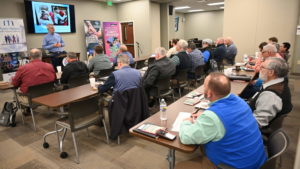One of the main problems in almost every occupation is getting along with people, and that certainly is true in the work of the church, according to Ken Sande, founder of Peacemaker Ministries and Relational Wisdom 360.
“Every conflict is an opportunity for us to demonstrate scriptural principles in caring for others,” he said. “The question we ask as believers is, ‘How can we be relational persons and channels of God’s love?’”
Sande was guest presenter at the Jan. 17 Intentional Leader event at the Alabama Baptist Board of Missions facility in Prattville. State missionaries Ken Allen and Rob Jackson served as hosts, and Allen explained it was the first of four conferences planned for 2023 to help identify areas of leadership growth.
‘Impulsive reactions’
“I often speak of a formula: Technical expertise multiplied by relational abilities yields value to the group,” Sande said. “But if relational skills are lacking, technical expertise isn’t enough to add value.
“Conflict can trigger impulsive reactions that we quickly regret,” he noted. “A little bit of heat in conflict often allows emotions to capsize us.
“I encourage Christians to realize that relationships are three-dimensional,” Sande continued. “In conflict between two people we often leave God out — I call this ‘going horizontal’ — but Jesus is hearing our words and reading our hearts. Remembering He is present changes everything.”

Sande suggested the acronym “SOG” to remember self, others and God, when involved in conflict.
Avoid responding impulsively and speaking words in haste, Sande counseled, encouraging taking a sip from a bottle of water or cup of coffee to buy six seconds before responding, or step away from the conflict for a few minutes to think and pray.
“If we can name our emotions and recognize them, we can control them, with God’s help,” Sande declared. “I call relational abilities ‘soft skills’ and they build social capital that helps us maintain relationships even when we have bad days and may not respond as we normally would.”
Willing to be wrong
Often relationships rather than theology bring about pastoral terminations, he noted.
“I’ve never had a deacon or elder say to me, ‘Our pastor had to go — his Hebrew skills were lacking,’” Sande quipped.
“Every pastor forced from the pulpit is a heartbreaking experience. Studies show that 48% of those forced from their pulpits leave ministry entirely. This is an incredible loss, but when pastors ‘get sideways’ with their leaders, it often leads to this kind of rupture.”
Sande said pastors must seek a gentle spirit, confess when they are wrong and be approachable, even when people come with criticism.
“Power can be enchanting, but we must be open when others have concerns or suggestions for us,” he said. “One of the most endearing things is when a pastor confesses wrong to the congregation and asks for their forgiveness and prayers.”
Sande’s organization uses negotiation tactics that help with understanding personal interests and the interests of others. He used the story of Abigail in 1 Samuel 25, who stopped King David’s murderous rage by appealing to what they both wanted and referring eight times to the God David served.
“She is one of the heroes of the Old Testament, and we use her story frequently,” Sande said.
Four principles
He provided four “Gs” to explain his approach to handling conflict.
“First we glorify God,” Sande stated. “This is what Paul said in 1 Corinthians 10:31, and this is always the primary goal for God’s people. I’ve heard some admit that God had nothing to do with the terrible things that happened in conflict, so they realized only later He was not honored.”
The second step is “get the log out of your own eye.”
“Confessing our sin … is a way to show our humanity and demonstrate we all need grace,” Sande said.
The third principle is “gently restore.”
“Paul’s word in Galatians 5 means to ‘glue’ the broken back together,” Sande said. “We approach gently in what I call ‘breathing grace’ to others. In those times when we have to confront others because of their wrong, we keep the matter as private as possible, and only involve others as needed.”
The fourth principle is “go and be reconciled.”
“Though there are areas of disagreement with the mores of the world, Christians must always manifest kindness and seek friendship, showing grace instead of legalism,” Sande said. “There’s no hope in the law — I call this ‘dumping “shoulds”’ on people — but there’s wonderful hope in grace.”
Sande is the author of “Resolving Everyday Conflict” and “The Peacemaker — A Biblical Guide to Resolving Personal Conflict,” both published by Baker Books. His website is rw360.org.
A schedule for three other Intentional Leader events is posted at leadercareal.org. Allen can be reached at 334-613-2210 or kallen@alsbom.org.







Share with others: